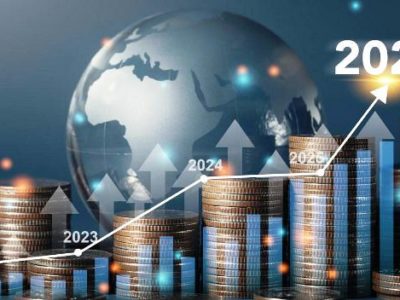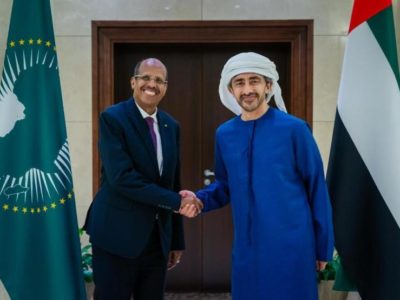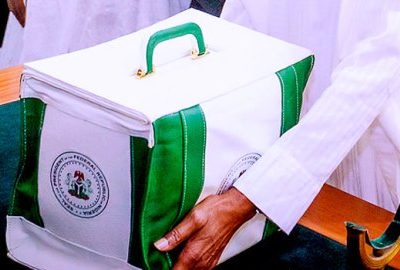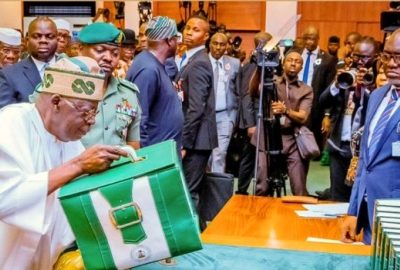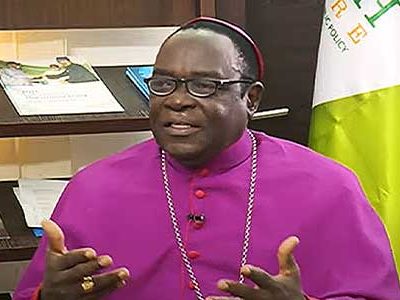Small-scale farmers from developing countries produce one-third of the world’s food, yet they only receive 1.7 per cent of climate finance even as they are forced to cope with droughts, floods, cyclones and other disasters.
This sentiment echoed through dozens of pavilions and conference rooms in Sharm el-Sheikh on Saturday as COP27 turned its attention to the vital issues of adaptation, agriculture and food systems in the context of climate change.
“We need to help rural populations build their resilience to extreme weather events and adapt to a changing climate. If not, we only go from one crisis to the next. Small scale farmers work hard to grow food for us in tough conditions,” Sabrina Dhowre Elba, Goodwill Ambassador for the UN International Fund for Agricultural Development (IFAD), said during a press conference.
As a Somali woman, Ms. Dhowre Elba said this issue was personal: as COP27 got underway her country had experienced four consecutive failed rainy seasons, a climatic event not seen in 40 years.
“I can’t stand idly by while mothers, families and farmers are suffering across the Horn of Africa as it experiences its most severe drought in recent history,” she explained, urging developed countries to mobilize political will and investments.
“Trillions of dollars were made available to tackle the COVID-19 pandemic and its economic consequences. The same is needed for climate change. The same is needed for sustainable agricultural support. It’s crucial to the well-being and the food security of us all,” she added.
Funds for adaptation must be delivered
Dina Saleh, the Regional Director of IFAD, explained that failure to help rural populations to adapt could have dangerous consequences, leading to longer poverty, migrations and conflict.
“This is why today we are calling on world leaders from developed nations to honour their pledge to provide the $100 billion a year in climate finance to developing nations and to channel half of that to have that amount to climate adaptation,” she underscored.
Thirteen years ago, at COP15 Copenhagen, developed nations made a significant pledge. They promised to channel $100 billion a year to less wealthy nations by 2020, to help them adapt to climate change and mitigate further rises in temperature. That promise, however, was not kept.
Ms. Saleh cautioned that there is a “narrow window” to help rural poor people to survive and protect their communities, and that crop yields could reduce by as much as 50 per cent by the end of the century.
“The choice is between adapting or starving,” she warned, urging COP27 to be about action, credibility and justice for the invisible and the silent.
A new initiative
Precisely to address these issues, the COP27 Egyptian Presidency launched on Friday the new initiative Food and Agriculture for Sustainable Transformation or FAST, to improve the quantity and quality of climate finance contributions to transform agriculture and food systems by 2030.
The cooperation programme will have concrete deliverables for helping countries access climate finance and investment, increase knowledge, and provide policy support and dialogue.
The UN Food and Agriculture Organization (FAO), along with other UN agencies, will be the facilitator of this initiative, which, according to Zitouni Ould-Dada, Deputy Director of the agency’s Climate and Environment Division, puts agriculture at the heart of efforts to tackle climate change.
“The message really is to recognize that agriculture must be an integral part of the solution to the climate crisis,” he told UN News.
The importance of investing in innovation
At the same time, while the agricultural and food sector is profoundly impacted by climate change, it also contributes around a third of global greenhouse emissions, from production to consumption, Mr. Ould-Dada explains, saying that there must be a transformation of the agri-food systems.
“We can’t continue with the current model of producing food and then degrading the soil, declining biodiversity, affecting the environment. No. It must be sustainable,” he notes.
The expert highlights that if the right choices are made, agriculture can be an important part of the solution to fight the climate crisis by sequestering carbon in soil and plants and promoting adaptation and resilience.
“We can’t produce the food to feed and nourish a growing population with the current model, with the threat of climate change. We can’t.”
The first thing the world should be tackling, he says, is addressing food waste, which is responsible for 8 per cent of global gas emissions.
The importance of investing in innovation
At the same time, while the agricultural and food sector is profoundly impacted by climate change, it also contributes around a third of global greenhouse emissions, from production to consumption, Mr. Ould-Dada explains, saying that there must be a transformation of the agri-food systems.
“We can’t continue with the current model of producing food and then degrading the soil, declining biodiversity, affecting the environment. No. It must be sustainable,” he notes.
The expert highlights that if the right choices are made, agriculture can be an important part of the solution to fight the climate crisis by sequestering carbon in soil and plants and promoting adaptation and resilience.
“We can’t produce the food to feed and nourish a growing population with the current model, with the threat of climate change. We can’t.”
The first thing the world should be tackling, he says, is addressing food waste, which is responsible for 8 per cent of global gas emissions.
Civil society calls for finance, economy transformation
UN representatives were not the only ones underscoring the need for countries to invest in transformation and deliver their climate finance promise.
A massive protest led by a coalition of environmental, women, indigenous, youth and trade union organizations took over the roads and pathways between the pavilions at COP27.
“Right to territories, rights to resources, human rights, indigenous people rights, loss and damage must be in all the negotiation texts…. 1.5 is not negotiable that is what we are here standing for,” said Hindou Oumarou Ibrahim, Chadian environmentalist and SDG advocate.
The activist stated that her people are dying because of floods, droughts, while some indigenous communities in the Pacific are losing their homelands.
“We want to have justice. Justice for our people, for our economies for loss and damage. We are losing our culture, our identity, our life, and these are not payable, but climate finance needs to be delivered,” she shouted amid hundreds of protesters.


